Andrew Furst's Blog, page 119
July 20, 2015
Meditation Makes You Feel Better – Poll Results
I’ve been running an unscientific poll on the One Minute Meditations I post twice a week. The poll asks If You Watched The One Minute Meditation, How Do You Feel? Do you feel different?
Here are the responses thus far.
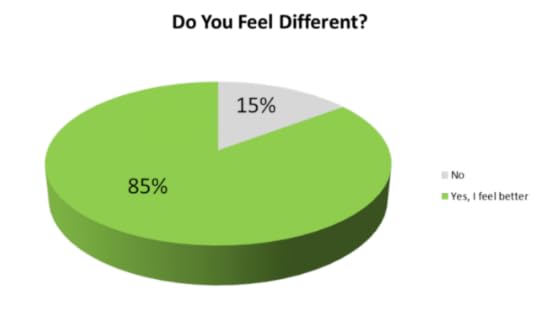
Of course, meditation and the Buddha’s path has so much more to offer than “feeling better”. But it’s not entirely bad news that people seem to see improvement in their well being.
The post Meditation Makes You Feel Better – Poll Results appeared on Andrew Furst.
A Conversation With an Evangelical – Dialectic Two Step
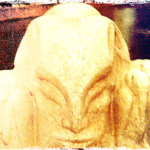 Dialectic Two-Step is an ongoing series of my thoughts on questions that come my way.
Dialectic Two-Step is an ongoing series of my thoughts on questions that come my way.
Wisdom lies neither in fixity nor in change, but in the dialectic between the two. - Octavio Paz
A Conversation With an EvangelicalThese are some questions posed to Buddhists by the evangelical theologian and apologist Dr. Norman Geisler’s in his 2009 book, Conversational Evangelism. I like the idea of a conversation between religions in a respectful manner. Here are my answers.
Is there any way to know whether we should choose one religion over another?Yes, whether there is evidence that the religion makes good on its doctrine
How can you determine if Buddhism is true?To consider a religion true, you would have to begin with its core tenets, test their veracity and continue until you’ve reached something false. If enough of the core is verified true, then you could hold out that the religion is true to some degree.
The core tenet of Buddhism is the acknowledgement of, cause, and cessation of suffering. Try it. If you decrease your suffering and that of others, then you can say that it’s “true.”
If Buddhism teaches that desire is wrong, how does your practice of Buddhism fit with your desire to win the lottery?Buddhism does not teach that desire is wrong. It teaches that seeking pleasure in temporary things will only offer temporary satisfaction. If we want to tackle chronic dissatisfaction, using short term fixes is not going to cut it.
My desire to win the lottery is not irrational though, it would help provide a means to support my family with a little less uncertainty. But I would need to be careful to avoid believing it’s going to solve most of my problems and provide me with lasting contentment.
Doesn’t the law of karma only postpone the solution to the problem of evil and suffering, but never really solves the problem?Karma’s relationship to the core teachings is tenuous. It’s difficult to understand how Buddhism and karma intersect. I feel it’s more of a bleed over of cultural mythology. It’s more of an explanation for the impossible question of “what happens after death.” The Buddha did not believe that answering that question offered any benefit to anyone. Further, the Four Noble Truths don’t directly call on the law of Karma to solve any problems.
If the death of Christ satisfied the punitive demands of the righteous laws of God, then what need would there be for more payment (see Romans 3:25-26; Hebrews 2:17; 1 John 2:2; 4:17-18)?This isn’t a question for Buddhists. It’s either a Christian theology question, a logical argument, or a truth claim. As a logical argument it’s invalid because it begs the question. From a theological perspective I’m out of my element. From a rational person’s perspective, I have a hard time accepting the resurrection story.
If there is no continuity with yourself after death, then how can it be the same person who is being rewarded in the next life?I have two thoughts on this. The first is about reincarnation. I believe this is another bleed over of Asian cultural mythology. The four noble truths don’t rely on reincarnation. Of course many Buddhists go in for this kind of thing, but I don’t make the connection to the core tenets of Buddhism.
The second thought is regarding continuity. There is no continuity of self in this life. We are temporary, always changing; like everything else we observe in the world. We are not the same at 40 as we were at 3 months. The idea of continuity into the next life makes even less sense. The question I’d pose to clarify my point is this. Which you is in the afterlife? Is it the 2 year old you or the 37 year old you? Is a body involved in the afterlife? If not, how is pleasure or pain experienced in heaven or hell? Again as a Buddhist, I don’t see any value in answering these questions, we can’t verify their answers. In fact attempts at constructing rational explanations of things like an afterlife usually lead to nonsense.
If it is not the same person who is reborn into another body, then why should someone pay for the karmic debt left by someone else?See my response to question 4.
Is it not true that if there is an ultimate moral law, then there is an ultimate Moral Lawgiver?As a Buddhist, I would say no to your premise that there is an ultimate moral law.
And if there is no ultimate moral law, then why should we follow the Buddhist 10 Precepts and the Eight-fold “Right” paths and reincarnation based on actions?Because it is a method to reduce suffering.
Is it true that Buddhism teaches that we are in reality an aspect of God and in some respects less than real as an individual? If so, how did this metaphysical amnesia arise and come to pervade and dominate our whole experience?Buddhism is a non-theist religion. Most Buddhists are non-dualists. So the western concept of God as an “other” anthropomorphic entity doesn’t fit into Buddhist philosophy.
There is something like the metaphysical amnesia you talk about captured in the teachings of the five skandhas. This helps us understand how we come to suffering by alienating ourselves from the world. We divide it up into me and other (a kind of dualism). As the delusion of separation matures we develop a longing for wholeness. We spend the rest of our lives trying to fulfill it, most commonly by way of consumption.
How can we know that the world of our senses is an illusion (not real) unless we know a backdrop of reality against which we can make this judgment?We discover this delusion by a matter of degrees. All we have is our sense perceptions (our “world”) and our concepts about the world. What lies beyond that is extrapolation and subject to error (see Godel’s Incompleteness Theorem). Delusion occurs when we rely heavily on our preconceptions about our “world”, rather than actually opening our minds to “the world”. We project upon the world our inner conditions. We see others problems in the context of our own. When we think like a hammer, all the world looks like nails.
The more we live in our preconceived notions about the world, the more we suffer. The more we open to our sense perceptions, the less we suffer. This is how we know that there is delusion.
Does not the goal to eliminate all desire involve the desire to eliminate all desire?Clever, See my answer to question 3. But also your question is a good one from a Buddhist perspective. Thinking it through betrays how ego lies at the root of our delusion.
If we should eliminate all desire, how about the desire to have children, help others, enjoy life, and experience nirvana?See my answer to question 3. Desires aren’t bad. It’s what we expect out of the transaction that trips us up.
Would it not be better to redirect desire to God who alone can fulfill than to eliminate all desire (Matthew 4:4; 5:6; 6:33)?You’d have to provide evidence that doing so would benefit me.
Get Each Week's Dialectic Two Step in your email box
First Name:
Last Name:
Email address:
In addition to a monthly email you can also subscribe to the following weekly series:
One Minute Meditations
Tiny Drops (Photography series)
Compass Songs (My Favorite Poems)
Dialectic Two-Step
Modern Koans (interesting questions)
Sunday Morning Coming Down (Music Videos)
Relics (Timeless Republished Articles)
Say What?
Quotes
Verse Us (Poems I Write)
The post A Conversation With an Evangelical – Dialectic Two Step appeared on Andrew Furst.
July 19, 2015
One Minute Meditation – Brothers of Sacred Heart Falls
 One Minute Meditations is an ongoing series of short videos, poems, and commentary intended as a meditation. Offered as an opportunity to step back from your cyber routine and settle into a more natural rhythm, if only for a minute.
One Minute Meditations is an ongoing series of short videos, poems, and commentary intended as a meditation. Offered as an opportunity to step back from your cyber routine and settle into a more natural rhythm, if only for a minute.
The Shawsheen River winds through Andover, Massachusetts, an affluent town just north of me. The river once powered the Shawsheen Mills, site of a model industrial community founded in 1919, by the American Woolen Company. In front of what was once the company’s executive offices -the Balmoral – is a small picturesque water fall over the Brothers of Sacred Heart dam.
These videos are produced for those of us who spend an inordinately large amount of time in the cyber-world. They are not a substitute for unplugging from your devices and taking a stroll near trees, water, or a patch of unkempt grass. Getting out into the world - touching, smelling, hearing, and seeing nature is the best way to reconnect with our prime purpose.
What is our prime purpose? We are feeling and sensing machines. We are the universe looking back on itself. We are witness to the wonders and dangers of living in this corner of the cosmos. We are the seekers looking for connection a little further beyond yesterday's borders and boundaries.
But sitting and staring at the screen robs us of the sustenance that we rely upon for wonder and sanity. These videos are an opportunity to bring the sensations of nature to you, while you're in the cyber-world. Its an opportunity to relax your gaze, resettle your posture, and regain some depth in your breath. Listen and watch the video and allow your self to open up and recharge.
Most of these are best viewed in full screen
Get Each Week's One Minute Meditation in your email box.mc4wp-form input[name="_mc4wp_required_but_not_really"]{display:none !important}
First Name:
Last Name:
Email address:
In addition to a monthly email you can also subscribe to the following weekly series:
One Minute Meditations
Tiny Drops (Photography series)
Compass Songs (My Favorite Poems)
Dialectic Two-Step
Modern Koans (interesting questions)
Sunday Morning Coming Down (Music Videos)
Relics (Timeless Republished Articles)
Say What?
Quotes
Verse Us (Poems I Write)
If You Watched The One Minute Meditation, How Do You Feel? Note: There is a poll embedded within this post, please visit the site to participate in this post's poll.
The post One Minute Meditation – Brothers of Sacred Heart Falls appeared on Andrew Furst.
Sunday Morning Coming Down – To Lay Me Down
 Sunday Morning Coming Down is an ongoing music video series. The songs fit my definition of music for a lazy couch bound Sunday morning.
Sunday Morning Coming Down is an ongoing music video series. The songs fit my definition of music for a lazy couch bound Sunday morning.
Reckoning was my favorite…
Get Each Week's Sunday Morning Coming Down in your email box.mc4wp-form input[name="_mc4wp_required_but_not_really"]{display:none !important}First Name:
Last Name:
Email address:
In addition to a monthly email you can also subscribe to the following weekly series:
One Minute Meditations
Tiny Drops (Photography series)
Compass Songs (My Favorite Poems)
Dialectic Two-Step
Modern Koans (interesting questions)
Sunday Morning Coming Down (Music Videos)
Relics (Timeless Republished Articles)
Say What?
Quotes
Verse Us (Poems I Write)
To Lay Me Down
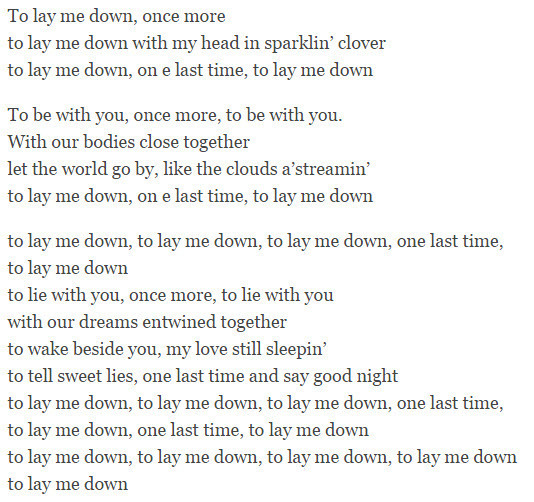
The post Sunday Morning Coming Down – To Lay Me Down appeared on Andrew Furst.
July 18, 2015
Is Buddhism A Real Religion? – Say What?

Say What? is an ongoing series of laconic exchanges on Buddhism in the format of a comic strip.
This shirt is dry clean only. Which means... it's dirty. - Mitch Hedberg
Is Buddhism A Real Religion?
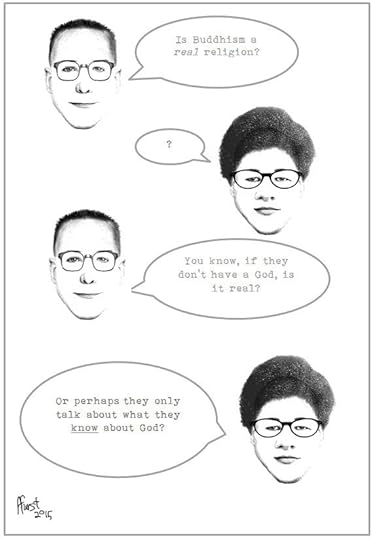
A Few Words On Religion.
Get Each Week's Say What? in your email box
First Name:
Last Name:
Email address:
In addition to a monthly email you can also subscribe to the following weekly series:
One Minute Meditations
Tiny Drops (Photography series)
Compass Songs (My Favorite Poems)
Dialectic Two-Step
Modern Koans (interesting questions)
Sunday Morning Coming Down (Music Videos)
Relics (Timeless Republished Articles)
Say What?
Quotes
Verse Us (Poems I Write)
The post Is Buddhism A Real Religion? – Say What? appeared on Andrew Furst.
Tiny Drops – Lines of the World – Part III
 Tiny Drops is an ongoing iPhoneographic series. The images represent moments of noticing on my part. For you, they are an offer to pause, observe, and take that noticing into your life. All photos are mine unless noted otherwise.
Tiny Drops is an ongoing iPhoneographic series. The images represent moments of noticing on my part. For you, they are an offer to pause, observe, and take that noticing into your life. All photos are mine unless noted otherwise.
 These works by Andrew Furst are licensed under a Creative Commons Attribution-NonCommercial-ShareAlike 4.0 International License.
These works by Andrew Furst are licensed under a Creative Commons Attribution-NonCommercial-ShareAlike 4.0 International License.
Click on images to view the full size slide show.
 Parking Garage Grid
Parking Garage Grid tracks filter
tracks filter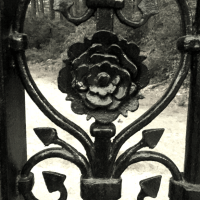 wrought iron roseGet Each Week's Tiny Drops in your email box.mc4wp-form input[name="_mc4wp_required_but_not_really"]{display:none !important}
wrought iron roseGet Each Week's Tiny Drops in your email box.mc4wp-form input[name="_mc4wp_required_but_not_really"]{display:none !important}First Name:
Last Name:
Email address:
In addition to a monthly email you can also subscribe to the following weekly series:
One Minute Meditations
Tiny Drops (Photography series)
Compass Songs (My Favorite Poems)
Dialectic Two-Step
Modern Koans (interesting questions)
Sunday Morning Coming Down (Music Videos)
Relics (Timeless Republished Articles)
Say What?
Quotes
Verse Us (Poems I Write)
FIVE LIMITLESS THOUGHTS
May all living beings have happiness and its causes
May all be free from unhappiness and its causes
May all dwell in equanimity, free of attraction and aversion
May all quickly find the great happiness that lies beyond all misery
May all enjoy inner and outer peace now and forever
NAMO AMITOFOThe post Tiny Drops – Lines of the World – Part III appeared on Andrew Furst.
July 17, 2015
Quote – Elbert Hubbard On Death
Dialectic Two-Step – Buddhism For Beginners?
 Dialectic Two-Step is an ongoing series of my thoughts on questions that come my way.
Dialectic Two-Step is an ongoing series of my thoughts on questions that come my way.
Wisdom lies neither in fixity nor in change, but in the dialectic between the two. - Octavio Paz
Buddhism For Beginners?Question: Can You Explain Buddhism For Beginners?
Response: In my experience, people come to Buddhism for a few reasons
They feel like something is missing in their lifeThey need to find peaceThey’re alienated from their root religion, but feel that there is something valuable in being spiritualFor all of these folks I offer this:
Buddhism as an exercise in (re)discovering ourselves. It’s a bit of a scientific endeavor. Buddhists make an effort to step beyond our assumptions about life to uncover the root of our dissatisfaction or disconnection with the world.
The Buddha made a simple observation about how we seek happiness. People gravitate towards either hedonism or rejection of worldly pleasures. Neither works. He noted that an attitude of acceptance and gratitude goes a long way towards improving our lot.
This is Buddhism, unlearning our habits of mindless hedonism or deprivation to uncover our natural propensity for contentment.
Get Each Week's Dialectic Two Step in your email boxFirst Name:
Last Name:
Email address:
In addition to a monthly email you can also subscribe to the following weekly series:
One Minute Meditations
Tiny Drops (Photography series)
Compass Songs (My Favorite Poems)
Dialectic Two-Step
Modern Koans (interesting questions)
Sunday Morning Coming Down (Music Videos)
Relics (Timeless Republished Articles)
Say What?
Quotes
Verse Us (Poems I Write)
The post Dialectic Two-Step – Buddhism For Beginners? appeared on Andrew Furst.
July 16, 2015
Quote – Shinran on Other Power
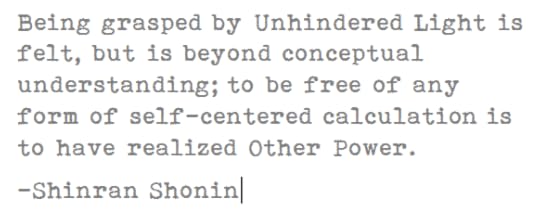
Other Power
The post Quote – Shinran on Other Power appeared on Andrew Furst.
One Minute Meditation – Spiraling
 One Minute Meditations is an ongoing series of short videos, poems, and commentary intended as a meditation. Offered as an opportunity to step back from your cyber routine and settle into a more natural rhythm, if only for a minute.
One Minute Meditations is an ongoing series of short videos, poems, and commentary intended as a meditation. Offered as an opportunity to step back from your cyber routine and settle into a more natural rhythm, if only for a minute.
During one of my frequent visits to Dana-Farber to take my father-in-law to appointments, I spent some time in the Stoneman Healing Garden to meditate. It is a lovely quiet space with plants and this hanging spiraling sculpture. It provided a few minutes of relaxation in the stressed out Longwood section of Boston.
These videos are produced for those of us who spend an inordinately large amount of time in the cyber-world. They are not a substitute for unplugging from your devices and taking a stroll near trees, water, or a patch of unkempt grass. Getting out into the world - touching, smelling, hearing, and seeing nature is the best way to reconnect with our prime purpose.
What is our prime purpose? We are feeling and sensing machines. We are the universe looking back on itself. We are witness to the wonders and dangers of living in this corner of the cosmos. We are the seekers looking for connection a little further beyond yesterday's borders and boundaries.
But sitting and staring at the screen robs us of the sustenance that we rely upon for wonder and sanity. These videos are an opportunity to bring the sensations of nature to you, while you're in the cyber-world. Its an opportunity to relax your gaze, resettle your posture, and regain some depth in your breath. Listen and watch the video and allow your self to open up and recharge.
Most of these are best viewed in full screen
Get Each Week's One Minute Meditation in your email box
First Name:
Last Name:
Email address:
In addition to a monthly email you can also subscribe to the following weekly series:
One Minute Meditations
Tiny Drops (Photography series)
Compass Songs (My Favorite Poems)
Dialectic Two-Step
Modern Koans (interesting questions)
Sunday Morning Coming Down (Music Videos)
Relics (Timeless Republished Articles)
Say What?
Quotes
Verse Us (Poems I Write)
If You Watched The One Minute Meditation, How Do You Feel? Note: There is a poll embedded within this post, please visit the site to participate in this post's poll.
The post One Minute Meditation – Spiraling appeared on Andrew Furst.




